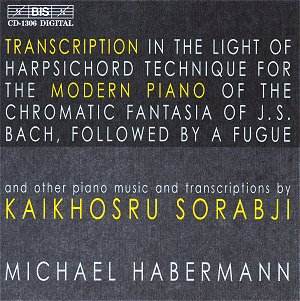Sorabji
is another of those composers whose reputation existed on fable.
Audacious pianists - wise or foolish - gradually sketched in the
details, sometimes in truth and at others unwittingly misleading.
It is difficult to gain a perspective but we know that far far
more about this composer's music is unknown than known. Of course
we have his books Mi Contra Fa (1947) and Around Music
(1932). From these we can glimpse his praise for two lions
of the transcriber's art: Liszt (whose operatic fantasies he held
in high regard) and Leopold Godowsky. It is the transcriber's
art that forms the centre of gravity for this disc. The Ravel
Rapsodie is no mere technical exercise. In this performance
there are many moments where poetic eloquence is to the fore (e.g.
the haunting Prélude à la Nuit and in the
Feria at 3.11 - those smokily languid slurs). At others
the ‘three-hand’ effects and fistfuls of notes leave you in awe
and an emotion I cannot quite pindown between tragically frustrated
aspiration and magnificent achievement. The Passeggiata
is based on Offenbach's famous Barcarolle. This is dissected
and dressed in threads of silvery gold gauze, diaphanous, iridescent.
The Notturnino section (there are six, each separately
tracked) carries a typically sultry expression marking: Sonnolento,
languidamente voluttuoso, sonorita sempre piena e calorosa.
The dedicatee is York Bowen whose Twenty-Four Preludes (praised
to the skies by Sorabji) were recorded by Marie-Catherine Girod
on a now difficult to source Opès 3D disc. The Passeggiata
is the only piece here of which Habermann did not give the
world premiere. Variation 56 is a Mephistphelian exercise
in ruthlessly motoric energy. The Quasi Habanera of 1917,
indolently languid as the expression mark indicates, is dedicated
to another unknown, Norman Peterkin. Peterkin's oriental suites
for solo piano are reputed to be of the highest imaginative accomplishment
and should be explored by an aspiring star pianist with the integrity
to make their debut recording with music that is a completely
closed book. The Quasi Habanera is not a transcription
and evinces none of the heroic contrivance of the Ravel reworking.
We are told in Mr Habermann's notes that the Bach transcription
has attracted controversy from purists. This is not surprising
for Sorabji builds Gaudi-like romantic excrescences and extravagant
ornamentation onto the original. The music can best be appreciated
if we approach it as a work in its own right and enjoy it as we
would a Stokowski or Elgar orchestral transcription. Simplicity
is not alien to Sorabji as the start of the Fugue (tr.14)
and the Ripresa of the Passeggiata (tr.10) show.
The Pasticcio capriccioso is his second reworking of the
Chopin piece. Its heaps wild chordal assaults and great awkward
screes of notes never lose site of the shards and shapes of the
original.
We
must take Habermann's Sorabjian 'truth' on trust and be grateful
for these thunderous and whispering intimations of a fantastic
composer's struggle to wrest something rich and strange from the
rude mechanical device of the keyboard.
The
British Music Society propose to issue a three CD set of Habermann’s
other Sorabji recordings. It is hoped that this will be out early
in 2004. See note below.
Rob
Barnett
see
also review by Colin
Clarke
British
Music Society reissues Sorabji Habermann recordings
The
BMS is proud to announce the re-release on its own label as a
Twenty-Fifth Anniversary Special 3CD Edition of pianist Habermann's
famed recordings of piano works of Kaikhosru Sorabji, originally
recorded over a period of some fifteen years from 1980-1995. Of
the seventeen titles included - newly remastered and reorganised
into three discrete programmes (Early Works, Nocturnes, and
Assertive Works) - all were originally prepared from the
composer's manuscripts and performed from memory, all except two
are premiere recordings, five were recorded live, and seven remain
the only available recordings. Included in the programme of over
three hours' music are the two great sensuously ravishing nocturnes
Djami and Gulistan, the Introito and
Preludio-Corale from Opus Clavicembalisticum, the
rigorous Prelude Interlude and Fugue, Le Jardin Parfumé,
two pieces inspired by ghost stories of M.R. James, and three
of Sorabji's inimitable piano pastiches. The discs will be available
as a boxed 3CD set, including a 28-page booklet at a special price
(BMS427-429). John Talbot, Recordings Manager
